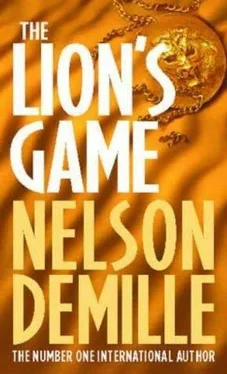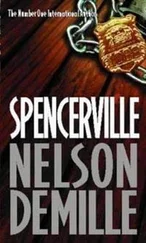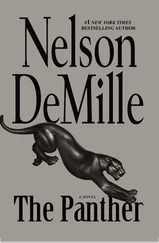CONFIDENTIAL.
I found it interesting that the file had been requested two days ago and had not been part of the original suspect file. In other words, Khalil turned himself in to the American Embassy in Paris on Thursday, and when they realized he was a suspect in Hambrecht's murder, then Hambrecht's Air Force file should have been here by Saturday-Monday latest. Here it was Tuesday, and this was the first I'd seen of the file. But maybe I was giving the Feds more credit than they deserved by thinking the file would have been one of their first priorities. Or, maybe somebody was trying to control information. As I had said to Kate, "Think about what's not on your desk." Someone had already done that, but I didn't know who, since there was no request tag attached to the Colonel Hambrecht file.
I said to Kate, "See if you have the personnel file of Colonel William Hambrecht." I held up the first page. "Looks like this."
Without glancing up, she said, "I know what it looks like. I requested it Friday, when I got the assignment to meet Khalil at the airport, and after I'd read his dossier. I read the file half an hour ago."
"I'm impressed. Daddy must have taught you well." "Daddy taught me how to get ahead in my career. Mommy taught me how to be nosy."
I smiled, then opened the file. The first page contained personal information, next of kin, home address of record, place and date of birth, and so on. I saw that William Hambrecht was married to Rose and had three children, he would have been fifty-five years old in March, had he lived, his religion was Lutheran, his blood type was A positive, and so forth.
I flipped through the file pages. Most of it was written in a sort of cryptic military jargon and was basically a precis of a long and apparently distinguished career. I thought perhaps Colonel Hambrecht had been involved with Air Force Intelligence, which may have brought him into contact with extremist groups. But basically the guy had been a pilot, then a flight commander, a squadron commander, and a wing commander. He had distinguished himself in the Gulf War, had lots of awards, unit citations, and medals, lots of postings around the world, was attached to NATO in Brussels, then was assigned to the Royal Air Force Station Lakenheath in Suffolk, England, as a staff officer involved with training. Nothing unusual, except that he'd previously been stationed at Lakenheath in January 1984 until May 1986. Maybe he made an enemy there back then. Maybe he was screwing some local's wife, got reassigned, and when he came back over a decade later, the husband was still pissed. That would explain the ax. Maybe this murder had nothing to do with Asad Khalil.
Anyway, I kept reading. Military stuff is hard to read, and they write in acronyms, such as "Return to CONUS," which I know means Continental United States, and "DEROS," which is Date of Estimated Return from Overseas, and so forth.
I was getting a headache reading acronyms and abbreviations, but pressed on. There was nothing in here, and I was prepared to put the file aside, but on the last page was a line that read: "Deleted Info-REF DoD order 369215-25, Exec Order 279651-351-Purp. Nat. Sec. TOP SECRET." They never abbreviate Top or State Secret, and it's always capitalized just to make sure you understand.
I mulled this over. This is what is known as a footprint in the files. Things may be deleted for a variety of reasons, but nothing is totally lost in an Orwellian memory hole. The deleted information exists someplace-in another file marked TOP SECRET.
I kept staring at the footprint, but even Sherlock Holmes' magnifying glass wouldn't help. There was no clue to what had been deleted, or when it had been deleted, or what time period it was missing from. But I knew who had deleted it and why. The who was the Department of Defense and the President of the United States. The reason was national security.
The order numbers would get someone access to the deleted information, but that someone was not me.
I thought about what might have been deleted and realized it could have been just about anything. Usually, it had to do with a secret mission, but in this case, it may have had something to do with Colonel Hambrecht's murder. Maybe both. Maybe neither. Maybe it had to do with screwing a local's wife.
There was also no hint if the deletion concerned honorable or dishonorable activities. But I would assume honorable, since his career seemed on track until the day someone mistook him for an oak tree.
Kate asked me, "So? What do you think?" I looked up at her. "I found what's not here." "Right. I already put in a request to Jack, who will put in a request up the chain to the Director, who will request the deleted information. That could take a few days. Maybe longer, though I marked it 'Urgent-Rush.'" She added, "This file is only marked 'Confidential,' and it took four days to get here. They're not real fast sometimes. 'Top Secret' takes longer." I nodded.
She said, "Also, if someone upstairs thinks we have no need to know, or if they determine that the deleted information is irrelevant to our purposes, then we'll never see it." She added, "Or, it may be relevant, but too sensitive for us to see, and someone else will handle it. I'm not holding my breath."
I considered all this and pointed out, "Probably the deleted information is not relevant, unless it had to do with his murder. And if so, why is that top secret?"
She shrugged. "We may never know."
"That's not what I'm getting paid for."
She asked me, "What kind of clearance do you have?"
"About six foot, one inch. Sorry, old joke." She wasn't smiling. I said, "Only confidential. Working on secret."
"I have a secret clearance. But Jack has top secret, so he can see the deleted stuff if he has a need to know."
"How will he know if he has a need to know if he doesn't know what's deleted?"
"Someone with a need to know and a top secret clearance will tell him if he has a need to know."
"Who's on first?"
"Not you." She informed me, "The Federal government is not the NYPD. But I guess you figured that out."
"Murder is murder. The law is the law. Lesson One of my curriculum at John Jay." I picked up the telephone and dialed the Ann Arbor, Michigan, telephone number given in the file, which was noted as unlisted.
The number rang, and an answering machine picked up. The voice of a middle-aged woman, undoubtedly Mrs. Hambrecht, said, "This is the Hambrecht residence. We can't come to the phone right now, but please leave your name and telephone number, and we'll return your call as soon as possible."
If by "we" she meant Colonel Hambrecht, he wasn't coming to the phone ever. A beep sounded, and I said, "Mrs. Hambrecht, this is John Corey, calling on behalf of the Air Force. Please call me back as soon as possible regarding Colonel Hambrecht." I gave her my direct dial number and added, "Or call Ms. Mayfield." I gave her Kate's number, which she read to me from her telephone. I hung up.
In the event we weren't in, our voice mail would just say, "Corey, Task Force," or "Mayfield, Task Force," followed by a pleasant request to leave a name and number. That was vague enough and didn't use the upsetting word "Terrorist."
So, putting this unlikely lead out of my mind, I again began my Incident Report, which was a bit overdue. Assuming no one would ever read this, I thought I could get away with four pages, numbered one to fifty, with blank pages in between. In fact, I decided to start at the end, and typed, "So, in conclusion…"
Kate's phone rang, and it was Jack Koenig. After a few seconds, she said, "Pick up."
I hit the button for Kate's line and said, "Corey." Mr. Koenig was in a cheery mood and said, "You're pissing me off." "Yes, sir." Kate held the phone away from her ear in a theatrical gesture.
Читать дальше












